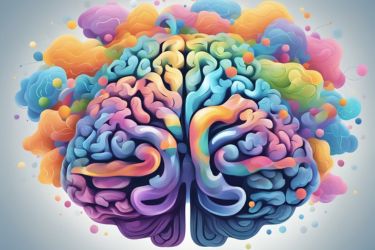Emotional intelligence plays a crucial role in our personal and professional lives. It is often seen as just as important as traditional intelligence, or IQ, in determining success. Understanding the five components of emotional intelligence—self-awareness, self-regulation, motivation, empathy, and social skills—helps us improve our emotional quotient (EQ) and enhances our ability to connect with others.
Daniel Goleman brought the concept of emotional intelligence to the forefront of our understanding. He emphasised that developing these five components can lead to better personal development and stronger relationships. By focusing on our emotional intelligence, we can respond more effectively to challenges, communicate clearly, and foster a positive environment, whether at work or in our personal lives.
As we explore these components, we uncover how mastering them can transform our interactions and decision-making processes. This knowledge empowers us to navigate our emotions and those of others, which is essential for achieving our goals and building meaningful connections. Let's dive into these five key areas and discover how they shape our emotional landscape.
The Importance of Emotional Intelligence

Emotional intelligence (EI) plays a key role in how we interact with others and manage our emotions. Understanding its significance can lead to better relationships and greater success in our personal and professional lives. Let’s explore its vital aspects below.
Differentiating EQ from IQ
Emotional quotient (EQ) is different from intelligence quotient (IQ). While IQ measures cognitive abilities, EQ focuses on our emotional skills.
Key Differences:
- IQ primarily relates to logical reasoning and problem-solving.
- EQ concerns understanding emotions and managing relationships.
Having a high EQ helps us navigate social situations more effectively. In many cases, people with higher emotional intelligence perform better in leadership roles than those with high IQs. This shows that mastering our emotions can be as important as intelligence in shaping our lives.
Enhancing Personal and Professional Relationships
Emotional intelligence significantly impacts our interpersonal relationships. By recognising and controlling our emotions, we can communicate more effectively.
We can show empathy, which allows us to connect with others on a deeper level. This understanding leads to stronger bonds, whether with friends, family, or colleagues.
Benefits of High EQ in Relationships:
- Improved communication skills
- Greater empathy and understanding
- Enhanced conflict resolution abilities
The ability to relate well to others is essential for personal growth and wellness. When we foster emotional intelligence, we create a more supportive environment for everyone.
Success in Life and Career
Emotional intelligence is crucial for achieving success in both life and career. High EQ contributes to better decision-making and stress management.
Individuals with strong emotional skills are often more motivated and resilient in overcoming challenges.
Factors Contributing to Success:
- Effective teamwork and collaboration
- Positive workplace culture
- Ability to give and receive feedback
Enhancing our emotional intelligence can lead to better career opportunities and life satisfaction. By focusing on developing these skills, we can achieve personal and professional goals more easily.
The Core Elements of Emotional Intelligence

Emotional intelligence consists of five key elements that help us navigate our emotions and interact effectively with others. We will explore each component, providing insights into how they contribute to our overall emotional skills.
Self-Awareness and Self-Reflection
Self-awareness is the ability to recognise and understand our own emotions. This skill enables us to see how our feelings affect our thoughts and behaviours. By practising self-reflection, we can identify our strengths and areas for improvement.
To enhance our self-awareness, we can try activities such as journaling or mindfulness. These practices help us connect with our thoughts and feelings. Understanding our emotional triggers also allows us to manage our responses effectively, leading to better decision-making.
Self-Regulation and Managing Emotions
Self-regulation involves controlling our emotions and reactions. This skill helps us respond appropriately in different situations. By managing our emotions, we can remain calm in stressful circumstances and avoid impulsive actions.
To develop self-regulation, we can utilise techniques like deep breathing or taking breaks. These strategies help us centre ourselves before reacting. By practising self-control, we foster resilience and adaptability, which are essential in both personal and professional settings.
Motivation and Personal Drive
Motivation refers to our internal drive to achieve goals. This component is about having a strong sense of purpose and persistence, even when facing challenges. Intrinsic motivation allows us to stay focused and committed to our objectives.
We can enhance our motivation by setting specific, achievable goals. Celebrating small successes along the way can also keep our spirits high. By maintaining a positive mindset, we can push through obstacles and maintain our enthusiasm for tasks.
Empathy and Understanding Others
Empathy is the ability to understand and share the feelings of others. This skill allows us to connect on a deeper level, fostering compassion and support. By being empathetic, we can respond to others' needs and help them feel valued.
To strengthen our empathy, we should practice active listening. Paying full attention to others when they speak encourages them to express themselves openly. Additionally, asking open-ended questions can help us gain insight into their emotions and perspectives.
Social Skills for Effective Communication
Social skills are critical for building strong relationships and effective communication. These skills help us express our thoughts clearly and understand others better. Developing our social skills enables us to navigate social situations with ease.
To improve our social skills, we can strive to be approachable and friendly. Practising body language and eye contact enhances how we connect with others. Engaging in group activities or teamwork reinforces our ability to cooperate and collaborate effectively.
Developing Emotional Competencies

Enhancing our emotional competencies is key to both personal and professional growth. We can focus on specific areas that help us manage our emotions and improve our interactions with others. Below, we explore four important aspects of developing these skills.
Cultivating Self-Confidence and Conscientiousness
Building self-confidence starts with recognising our strengths and achievements. We can create a list of accomplishments to remind ourselves of our abilities. Setting clear goals can also boost our confidence as we work towards them.
Conscientiousness involves being responsible and dependable. We should prioritise our tasks and follow through with commitments. This reliability builds trust with others and strengthens our relationships, both personally and professionally.
Adaptability and Innovation
In today's fast-moving world, adaptability is crucial. We must embrace change and be open to new ideas. This means staying curious and willing to learn. We could engage in activities that push us outside our comfort zone.
Innovation often arises from adaptability. We should encourage brainstorming sessions where team members feel free to express creative ideas. This collaborative approach not only fosters innovation but also strengthens our collective problem-solving skills.
Conflict Resolution and Stress Management
Conflict is a normal part of any relationship. We can improve our conflict resolution skills by actively listening and understanding different perspectives. Practising empathy helps us connect with others’ feelings, which can lead to a more peaceful resolution.
Managing stress is also vital in emotional intelligence. Techniques such as deep breathing, mindfulness, and regular exercise can help us stay calm. When we manage our stress effectively, we are better equipped to handle conflicts and maintain positive relationships.
Teamwork and Collaboration
Teamwork is essential for achieving common goals. We should recognise the value that each team member brings. Appreciating diverse viewpoints fosters a supportive environment where everyone feels valued.
Effective communication is key to successful collaboration. We must practise giving and receiving constructive feedback. This openness encourages trust and cooperation, allowing us to work together more efficiently towards shared objectives.
Applying Emotional Intelligence in Leadership

Emotional intelligence is vital in leadership as it helps us influence others and act as change catalysts. By developing team capabilities and leveraging diversity, we can create a more effective and engaged workforce.
Influence and Change Catalyst
Being an effective leader requires the ability to influence others positively. We can achieve this by using our emotional intelligence skills. By recognising emotions in ourselves and others, we build trust and rapport within our teams.
When we act as change catalysts, we encourage colleagues to embrace new ideas and adapt to challenges. We listen actively and show empathy, which allows us to address concerns and motivate others to engage with change. By maintaining open communication, we foster an environment where team members feel valued and understood.
Developing and Leveraging Team Capabilities
We have a responsibility to develop and leverage our team’s capabilities. By identifying individual strengths and areas for improvement, we can tailor our approach to training and development. This ensures each team member receives the support they need to thrive.
Diversity within our teams is an asset. By appreciating different perspectives, we enhance creativity and problem-solving. Our role as leaders is to create an inclusive environment where everyone feels safe to share their ideas. Through effective relationship management, we can tap into this diversity to achieve our goals more effectively.
Measuring and Enhancing Emotional Intelligence
To effectively measure and enhance our emotional intelligence, we can use various self-assessment tools and techniques. Additionally, implementing specific methods for improvement can lead to significant personal growth and development in our emotional skills.
Self-Assessment Tools and Techniques
We can start by using self-assessment questionnaires to gauge our emotional intelligence. Tools like the EQ-i (Emotional Quotient Inventory) offer insights into our emotional skills. Such assessments usually cover key areas, including self-awareness, self-regulation, and interpersonal skills.
Another useful technique is keeping a journal. By recording our thoughts and feelings, we can observe our emotional reactions in different situations. This practice helps us identify patterns and triggers, making it easier to understand our emotions.
Lastly, seeking feedback from trusted friends or colleagues can provide external perspectives on our emotional responses. Constructive feedback helps us pinpoint our strengths and areas needing improvement.
Methods for Improvement and Growth
Improving emotional intelligence often requires deliberate effort. One effective method is practising mindfulness. Mindfulness encourages us to focus on the present moment. It helps reduce stress and increases our awareness of emotional cues.
Engaging in role-playing exercises can also enhance our interpersonal skills. These activities allow us to simulate various social situations and practice our responses. This hands-on approach boosts our confidence in real-life interactions.
Additionally, we should strive for continuous learning. Attending workshops or seminars on emotional intelligence can introduce new concepts and techniques. Combining these methods fosters our emotional development and cultivates better problem-solving skills in our daily lives.





















